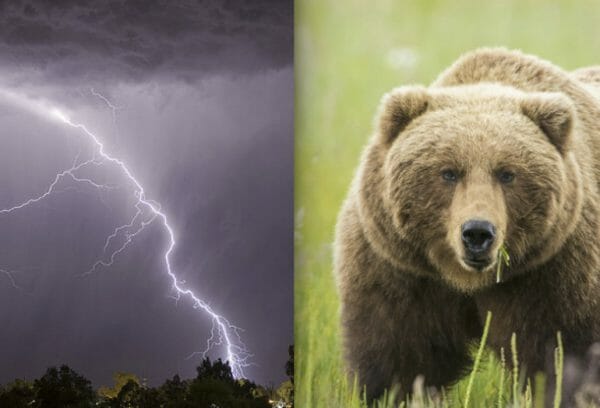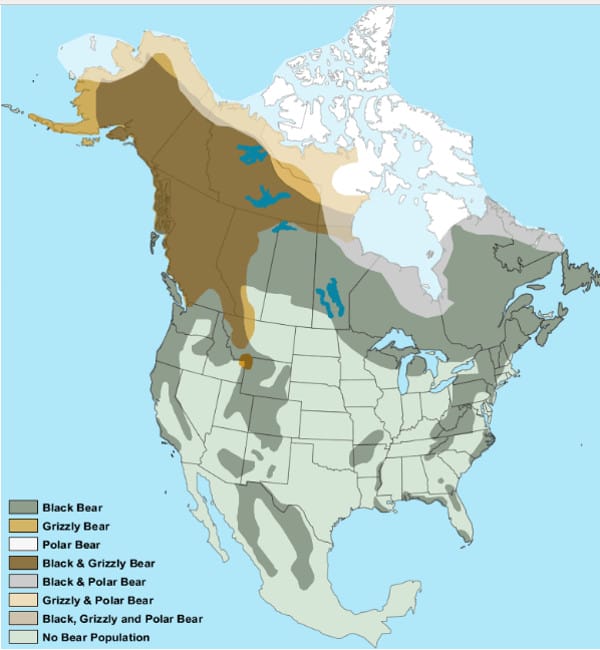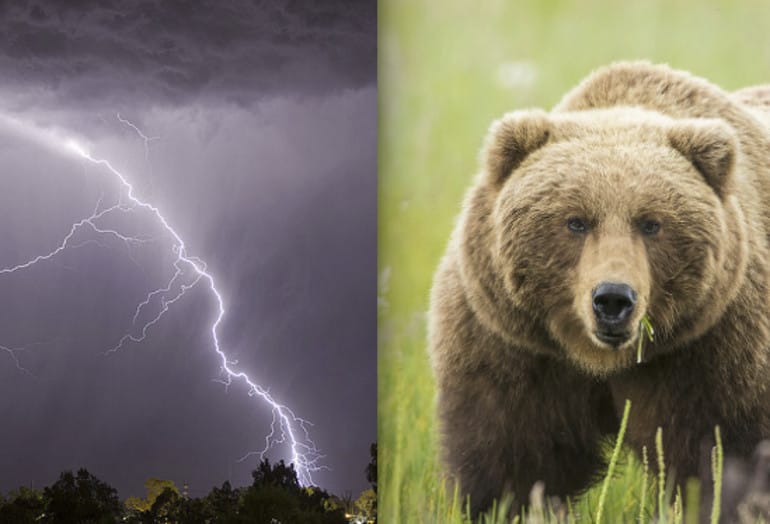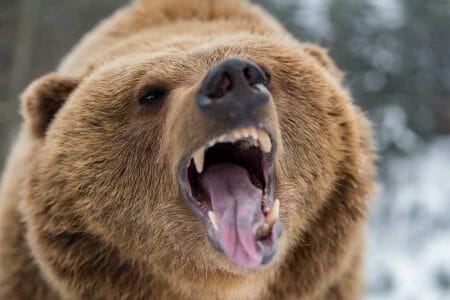
Arizona -(Ammoland.com)- In online discussions of bear attacks, it is not unusual for people to claim that a person is more likely to be killed by lightning than to be killed by a bear. That is true, in a gross sense. You are also more likely to die of a heart attack or to be murdered than to be killed by a bear when you use the entire United States population as a measure.
This comparison is disingenuous. It is easy to avoid being killed by a bear, simply by staying out of areas where there are bears. Lightning strikes occur all over the United States. Significant bear populations are limited to a fraction of the United States. The relative danger of bears and lightning depends a great deal on where you are.

I looked up lightning deaths in areas where there are significant bear populations. What I found was startling. Wyoming is rated as the most dangerous state for lightning deaths, per capita. Wyoming is also one of the top states for fatal bear attacks.
During the decade from 2004-2014, there were two deaths from lightning strikes in Wyoming. During the same period, four people were killed by bears. At least for that decade, for Wyoming, bears were twice as likely to be the cause of death as lightning. The number of people killed by bears has been rising in the last two decades, while the number of people killed by lightning is falling.
Consider Alaska. Lots of bears, and lots of lightning. But Alaska has had zero, zilch, nada people killed by lightning since 1990! During the same period, 1990 to 2014, 16 people were killed by bears in Alaska. Two more people were killed by bears in Alaska in 2017. I have not found any lightning deaths in Alaska for the period after 2014. In Alaska, people are far more likely to be killed by bears than by lightning.
While looking for bear attack information, and lightning, I came across a site from the National Park Service for Yellowstone National Park. During the period since the park was created, there have been more people killed by bears (eight) than have been killed by lightning (five). From nps.gov:
Since Yellowstone was established in 1872, eight people have been killed by bears in the park. More people in the park have died from drowning, burns (after falling into hot springs), and suicide than have been killed by bears. To put it in perspective, the probability of being killed by a bear in the park (8 incidents) is only slightly higher than the probability of being killed by a falling tree (6 incidents), in an avalanche (6 incidents), or being struck and killed by lightning (5 incidents).
In most of the United States, there are few bears, and few bear attacks, or people killed by bears. But in areas where there are lots of bears, especially grizzly bears, bears are a much greater risk than lightning, as the data from Alaska, Wyoming, and Yellowstone National Park (quite a bit of overlap with Wyoming) show.
If you are in the woods, and are confronted by a bear, the odds of an attack have increased enormously. The reason bear attacks are rare is because most people spend little time where bears are. In areas where bears are hunted heavily, most bears learn to fear humans. Bears that have lost fear of humans are very dangerous.
If you see a bear, and the bear does not run off, you may be one of the unlucky, statistical, few for whom a bear attack becomes a reality.
©2018 by Dean Weingarten: Permission to share is granted when this notice is included.
About Dean Weingarten:
Dean Weingarten has been a peace officer, a military officer, was on the University of Wisconsin Pistol Team for four years, and was first certified to teach firearms safety in 1973. He taught the Arizona concealed carry course for fifteen years until the goal of constitutional carry was attained. He has degrees in meteorology and mining engineering, and recently retired from the Department of Defense after a 30 year career in Army Research, Development, Testing, and Evaluation.







Coincidentally while posting the last time on here, there was actual lightning and thunder at this location, with herds of cattle nearby, and neighbors who are packing against hungry bears.
You might think that because of the past record here, in this locale, we could have expected the worst? There are more bears than human beings. Seemed like a perfect storm.
Add to that the happenstance of your article!! Whew. Thanks for your patience. Nothing happened today either, but tomorrow only God knows. You can bet on that.
I see lightning killed cattle and packs of bears. Aside from that, “merely” being mauled by a predator, or even a cow, probably happens more often than death. Why not expand the category to include that kind of incident? People learn not to ride in storms or peek out over the top of a hill during unruly weather. Visitors are not so savvy. But death catches the imagination. Getting mauled sticks in your mind.
You are really more likely to be killed by the weather or bugs, than being attacked by bears, even inside those risk zones. Those old records are limited to death by bear, though not near deaths limited by big pistols or rifles. You need a proxy. Too bad they don’t also count the number of cattle killed by lightning because in places they also are more likely to be killed by the bears. You might find stories about entire herds being decimated either way, though I’m guessing lightning is the worst.
“Those old records are limited to death by bear, though not near deaths limited by big pistols or rifles.”
Looks like I’m still thinking about the bear-pistol debate. The records leave huge gaps and have few examples. Statistical debate aside, don’t go out there and overlook the fact you really can’t know entirely what you’re going to encounter where ever you might travel.
Just don’t stick your big pistol out at a bear during a thunderstorm dude…or golf during a storm.
It is good when the bear that is about to attack you is struck by lightning. Do we have any statistics on potential attackees saved at the last second by lightning-fried bear?
The real question is twofold: 1. Is the hide salvageable on a lightening fried bear and 2. How does the meat taste? 🙂
@Vanns, I like the way you think!